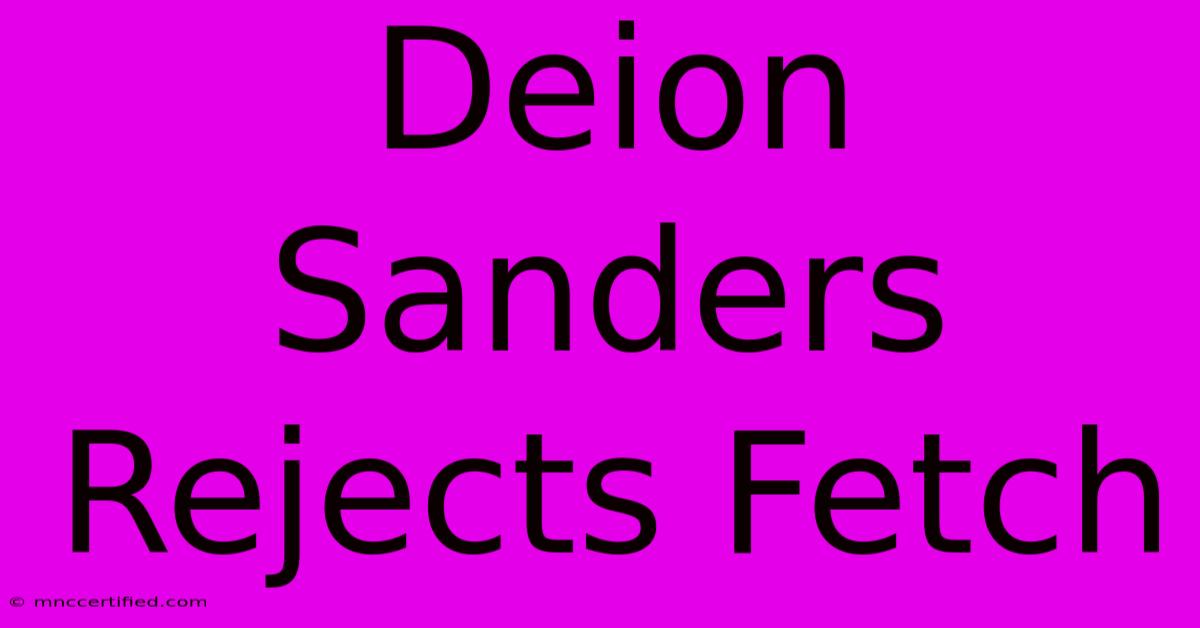Deion Sanders Rejects Fetch

Table of Contents
Deion Sanders Rejects Fetch: A Prime Example of Brand Alignment (and Misalignment)
Deion Sanders, the legendary "Prime Time," is known for his unwavering self-brand. So when news broke that he'd rejected a lucrative sponsorship deal with Fetch Rewards, it sent ripples through the sports marketing world. This wasn't just a simple rejection; it was a powerful statement about brand alignment – or rather, the lack thereof. Let's delve into why Coach Prime's decision highlights the crucial importance of brand synergy in today's landscape.
Why Did Deion Sanders Reject Fetch?
While the specifics of the negotiations remain undisclosed, the underlying reason is clear: a mismatch in brand values and target audiences. Fetch Rewards, a rewards app focusing on grocery shopping, likely presented an offer too tempting to refuse for most athletes. However, Deion Sanders operates on a different level. His brand transcends mere athletic achievement; it's built on a foundation of excellence, ambition, and a strong religious faith.
This carefully cultivated image doesn't seamlessly integrate with the everyday, relatively mundane nature of grocery shopping rewards. While Fetch has a broad audience, it doesn't resonate with the aspirational, high-achieving demographic that Sanders cultivates. The incongruence created a disconnect that ultimately led to the rejection.
The Importance of Brand Synergy
This incident underscores the critical need for brand synergy in sponsorship deals. A successful partnership requires a harmonious alignment between the athlete's personal brand and the company's values, image, and target market. A forced fit, as potentially seen in the Fetch-Sanders scenario, often results in a lackluster campaign, diluted brand image, and ultimately, a missed opportunity for both parties.
Sanders' decision isn't about rejecting money; it's about preserving his meticulously crafted brand. He understands the long-term consequences of associating with a brand that doesn't authentically reflect his values and persona. This strategic approach speaks volumes about his business acumen and long-term vision.
What Brands Do Align with Deion Sanders?
Considering Sanders' strong brand identity, what kind of sponsorships would be a better fit? Companies that align with his values of excellence, faith, family, and leadership would be ideal partners. This could include brands focused on:
- High-end apparel and accessories: Brands that emphasize quality, style, and a premium experience would naturally resonate with Sanders' image.
- Financial services: Companies promoting financial literacy, investment, and wealth management could tap into his entrepreneurial spirit and success.
- Faith-based organizations and charities: Partnerships reflecting his strong religious beliefs would further solidify his connection with his target audience.
- Technology and innovation: Companies focused on cutting-edge technology could align with his forward-thinking approach and emphasis on progress.
By selectively choosing sponsorships that truly align with his brand, Deion Sanders demonstrates a masterclass in brand management. His rejection of Fetch is not a failure; it's a strategic move that strengthens his brand equity and showcases his commitment to authenticity.
Lessons Learned from Deion Sanders' Rejection
The Deion Sanders-Fetch situation offers valuable lessons for both athletes and brands:
- Authenticity is Key: For athletes, aligning with brands that genuinely reflect their values is paramount for long-term success. Forced partnerships rarely yield positive results.
- Know Your Audience: Brands need to understand the target audience of their potential ambassadors. A mismatch in demographics and values can lead to ineffective campaigns.
- Long-Term Vision over Short-Term Gains: Prioritizing brand alignment over immediate financial incentives demonstrates foresight and strengthens brand reputation in the long run.
Deion Sanders' rejection of Fetch is a prime example of how a well-defined and strategically managed personal brand can lead to impactful decisions, even when faced with substantial financial incentives. His story serves as a valuable case study in the evolving landscape of sports marketing and brand alignment.

Thank you for visiting our website wich cover about Deion Sanders Rejects Fetch. We hope the information provided has been useful to you. Feel free to contact us if you have any questions or need further assistance. See you next time and dont miss to bookmark.
Featured Posts
-
Bad Faith Insurance Companies List
Nov 17, 2024
-
Livestream Ohio State Vs Northwestern Football
Nov 17, 2024
-
Ufc 309 Full Fight Card And Start Time
Nov 17, 2024
-
Bisnett Insurance Pendleton Oregon
Nov 17, 2024
-
Free Live Stream Ohio State Vs Northwestern
Nov 17, 2024